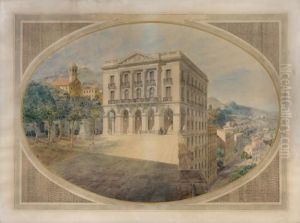Gustave Umbdenstock Paintings
Gustave Umbdenstock was a French architect who became well-known for his contributions to the architectural landscape of France during the late 19th and early 20th centuries. Born in Mulhouse, Alsace, on April 16, 1876, Umbdenstock showed an early interest in architecture and went on to study at the École Nationale Supérieure des Beaux-Arts in Paris. This institution was renowned for its rigorous training and had a profound influence on shaping the artistic and architectural talents in France.
During his career, Umbdenstock worked on various projects ranging from residential buildings to grand public edifices. His architectural style was influenced by the Beaux-Arts movement, characterized by grandeur, symmetry, and a strong emphasis on detail. This style was dominant in France during his time and was also favored for many public buildings and urban developments in the United States.
One of Gustave Umbdenstock's most notable projects was the collaboration with architect Louis Parent on the reconstruction of the Mulhouse Town Hall, which was severely damaged during World War I. The project showcased his ability to blend traditional architectural forms with modern requirements, a hallmark of his professional approach.
Despite his achievements, Gustave Umbdenstock may not be as widely recognized as some of his contemporaries like Hector Guimard or Auguste Perret, who were also active during the same period and contributed to the architectural heritage of France. Nevertheless, his work remains a part of the rich mosaic of French architecture from the turn of the century.
Umbdenstock's career was also marked by his engagement with architectural education. After establishing himself as a competent architect, he took on a role as an educator, influencing the next generation of architects with his knowledge and experience. Gustave Umbdenstock passed away on September 3, 1946, leaving behind a legacy of architectural works that continue to be studied and appreciated for their craftsmanship and adherence to the Beaux-Arts tradition.
